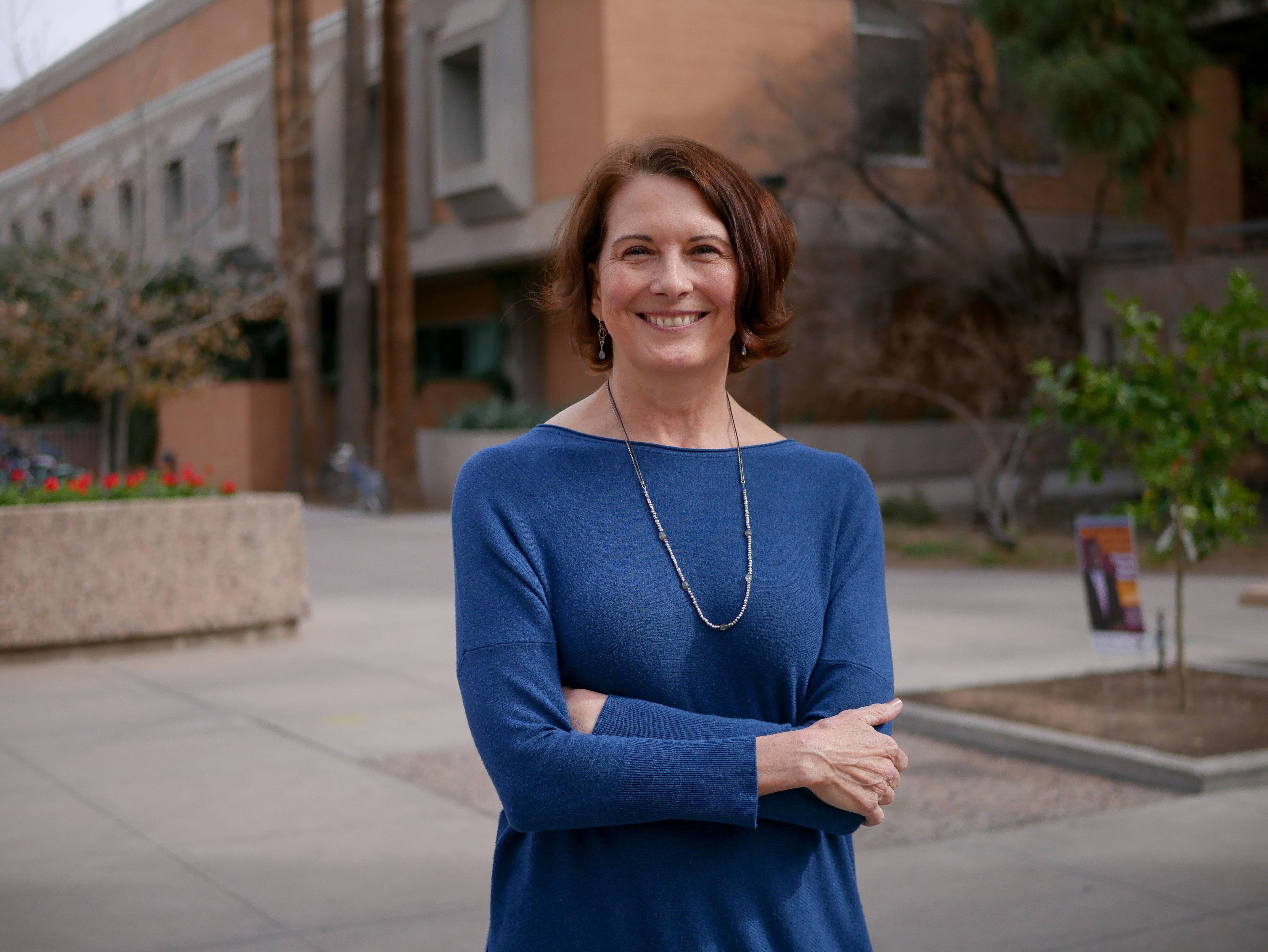2020 Distinguished Scientific Contribution Award Keynote Address
Danielle McNamara, Arizona State University |
 |
Danielle S. McNamara is a Professor of Psychology in the Psychology Department at Arizona State University. Much of Dr. McNamara’s research examines issues relevant to text and discourse processing, most notably reading comprehension and writing. Her research has explored factors that impact comprehension and writing quality (e.g., cohesion, prior knowledge, literacy, strategies). As an extension of this research, she has developed two intelligent tutoring systems, iSTART and Writing Pal, to provide students with adaptive comprehension and writing strategy instruction and practice. Research on these technologies has explored methods for improving student engagement via game-based practice, enhanced adaptability functions, and assessed the feasibility and usability of these systems in real world settings (see adaptiveliteracy.com). Her research also involves the development natural language processing (NLP) techniques as a means of providing students with adaptive feedback during strategy instruction as well as analyzing text and discourse. The use of these techniques has prompted the development of specialized tools (e.g., Coh-Metrix; see soletlab.asu.edu) allowing for quick, efficient, and reliable analyses of large corpora of text. Such tools have been used in various research projects involving reading comprehension, essay writing, intelligent tutoring systems, collaborative learning environments, physician secure messaging systems, and online courses. Dr. McNamara has served as an associate editor of five journals, and currently serves as the founding editor of APA’s Technology, Mind, and Behavior (tmb.apaopen.org). She has published over 450 scholarly works (books, journal articles, chapters, proceedings) and received over 30 federal grants. Dr. McNamara’s dedication to issues related to text and discourse is evidenced by her scholarship as well as her service to ST&D as past president as well as two terms on the governing board. Dr. McNamara’s innovative and ground-breaking scholarship continues to revolutionize how we understand text and discourse processing in formal and informal settings, seeking to move us toward enhanced and sustainable literacy for all.
Chasing Theory with Technology: A Quest to Understand Understanding
An overarching motivation driving my research has been to further our theoretical understanding of how readers successfully comprehend challenging text. This presentation will describe the theoretical origins of this research program, and my quest to understand comprehension processes through the use of technology. One approach that I have taken to better understand comprehension is to attempt to change it. For example, iSTART was developed to provide students with instruction and practice on how to explain text and more effectively make use of limited prior knowledge. Coh-Metrix was developed to measure, and in turn facilitate manipulations of text cohesion and text ease. In addition, we have developed technologies to measure and change writing quality, relations between ideas, and emerging text comprehension. More recently, our attention has turned to comprehension of multiple documents. Understanding relations between documents and how comprehension emerges when reading multiple sources is important educationally, and socially, where the internet provides a continuous stream of reliable and unreliable sources. Across these topics, my collaborators and I have conducted numerous experimental studies, but a central theme to my work has been the use of technology. This presentation will describe these technologies, including game-based tutoring systems, natural language processing, and computational simulations and how they have informed my theoretical and practical understandings of language, comprehension, social interactions, and cognition.
The ST&D 2020 Distinguished Scientific Contribution Award Address will take place on Tuesday, July 21, 1:00-2:00 PM EST during the ST&D 2020 Live Zoom Session. Link to be shared with conference registrants prior the address.
Previous Recipients of the Distinguished Scientific Contribution Award
| 2019 | Jane Oakhill | 2013 | Morton Ann Gernsbacher |
| 2018 | Murray Singer | 2012 | Marcel Adam Just |
| 2017 | Susan R. Goldman | 2011 | Simon Garrod & Anthony Sanford |
| 2016 | Paul van den Broek | 2010 | Arthur C. Graesser |
| 2015 | Jerome L. Meyers & Edward J. O'Brien | 2009 | Herbert Clark |
| 2014 | Charles A. Perfetti | 2008 | Walter Kintsch |
Distinguished Scientific Contributions Award Committee: Paul van den Broek (chair), Jane Oakhill, Gale Sinatra, Murray Singer, & Mike Wolfe. This award honors scholars who have made outstanding scientific contributions to the study of discourse processing and text analysis. The following criteria will be considered in conferring the Award: (1) Sustained outstanding research that has enhanced the scientific understanding of discourse processing and text analysis, (2) Contributions to the mentorship of students, postdoctoral fellows, and colleagues in the field of text and discourse, and (3) Meritorious contributions to the advancement of the field through leadership as a theorist or spokesperson for the discipline.
2020 Keynote Address for the 2019 Tom Trabasso Young Investigator Award
Jason L.G. Braasch, Georgia State University |
 |
Jason L. G. Braasch is an Associate Professor in the Department of Learning Sciences at Georgia State University. He is also an affiliate of the Adult Literacy Research Center. He has been selected to receive the 2019 Tom Trabasso Young Investigator Award, which recognizes exceptional and innovative contributions to discourse research and superior promise as a leader in the field. Dr. Braasch was recognized for his important contributions to our understanding of cognitive processes that underlie the evaluation of content and source information when reading texts found on the Internet, and the ways individual differences like reading skill promote (or undermine) successful learning. He has also developed and implemented classroom-based interventions to improve strategies for thinking critically about information found within text(s). Dr. Braasch is on the editorial boards of Contemporary Educational Psychology, Discourse Processes, and the Journal of Educational Psychology. He is also on the governing board for the Society for Text and Discourse. Dr. Braasch recently served as co-editor of the Handbook of Multiple Source Use, which was published by Routledge in 2018.
Establishing a Theoretical Model of Source Comprehension in Everyday Discourse
Comprehension in the 21st century substantially benefits from attending to, thinking about, and positioning the sources of any presented information. Doing so requires mental effort, and unfortunately people do not always engage in such activities. In this talk I describe a nascent, evolving model of discourse comprehension that formalizes mechanisms to predict and explain people’s strategic use of source information. The discrepancy-induced source comprehension (D-ISC) model and its assumptions help explicate the moment-by-moment cognitive processes readers engage in when they interact with potentially contradictory or controversial messages presented by varied information sources. The utility of the model is supported by evidence from a growing research base examining single and multiple text comprehension experiences. The model is also useful for suggesting future directions by way of testable hypotheses that could help build more nuanced understandings with respect to people’s understandings of materials presented from diverse sources and outlets.
The ST&D 2020 Award Keynote Address for the 2019 Tom Trabasso Award will take place on Wednesday, July 22, 1:00-2:00 PM EST during the ST&D 2020 Live Zoom Session. Link to be shared with conference registrants prior the address.
2020 Tom Trabasso Young Investigator Award
Doug Lombardi, University of Maryland |
 |
Doug Lombardi holds a PhD in Educational Psychology from the University of Nevada, Las Vegas, and is an Associate Professor in the Department of Human Development and Quantitative Methodology at the University of Maryland. As the head of the Science Learning Research Group (http://sciencelearning.net), he conducts research examining discourse and reasoning about knowledge claims. Much of this research is situated within the context of formal classroom settings and focuses on effective teaching tools and strategies to support deep learning and understanding, particularly about socio-scientific topics that pose local, regional, and global challenges (e.g., causes of current climate change, availability of freshwater resources). Doug’s empirical research and theoretical positions have been published in journals such as Educational Psychologist, Discourse Processes, Learning & Instruction, Science Education, and Contemporary Educational Psychology.
Dr. Lombardi will give the 2021 Award Address for the 2020 Tom Trabasso Young Investigator Award at the 2021 annual meeting of the Society for Text & Discourse in Olso, Norway, June 23-25, 2021.
Previous Recipients of the Tom Trabasso Young Investigator Award
| 2019 | Jason L. G. Braasch | 2013 | Tobias Richter |
| 2018 | Sidney D'Mello | 2012 | Panayiota Kendeou |
| 2017 | Catherine Bohn-Gettler | 2011 | Chantel Prat |
| 2016 | Raymond Mar | 2010 | David N. Rapp |
| 2015 | Scott Crossley | 2009 | Michael Kaschak |
| 2014 | Katherine Rawson |
Tom Trabasso Young Investigator Award Committee: Panayiota Kendeou (Chair), M. Anne Britt, Keith Millis, & Chantel Prat This award goes to an outstanding young investigator who embodies Tom Trabasso’s spirit of mentoring young scholars and creating a supportive context in our Society. Recipients have shown exceptional and innovative contributions to discourse research and demonstrated superior promise as leaders in the field.
2020 Jason Albrecht Outstanding Young Scholar Award
Reese Butterfuss, University of Minnesota |
 |
Revising Misconceptions with Multiple Documents (with Panayiota Kendeou)
The Knowledge Revision Components Framework (KReC) describes how a refutation text facilitates revision of misconceptions. However, readers frequently engage with multiple documents, but we lack understanding of knowledge revision in multiple-document contexts. Thus, we propose a new framework, KReC-Multiple Documents, to predict how factors such as source credibility and multiple-document integration influence revision with multiple refutation texts. Results indicate that high-credibility sources and greater multiple-document integration facilitate better knowledge revision, illustrating initial viability of KReC-MD. This research can be found in Session 15DL Poster Session IV - Knowledge, Beliefs, and Misconceptions.
Previous Recipients of the Jason Albrecht Outstanding Young Scholar Award
| 2019 | Brianna L. Yamasaki | 2007 | Heather Fergusun |
| 2018 | Shelley Feuer | 2006 | Heather H. Mitchell |
| 2017 | Karyn Higgs | 2005 | Not awarded |
| 2016 | Juliane Richter | 2004 | Amelie Teisserenc |
| 2015 | Angela Nyhout | 2003 | Sabine Gueraud |
| 2014 | Stephen Briner | 2002 | David N. Rapp |
| 2013 | Emily R. Smith | 2001 | Max Louwerse |
| 2012 | Jesse R. Sparks | 2000 | Steve Frisson |
| 2011 | Mike Mensink | 1999 | David Robertson |
| 2010 | Jennifer J. Stiegler | 1998 | Herb Colston |
| 2009 | Michele Levine | 1997 | Marie-Pilar Quintana |
| 2008 | Patrick Jeuniaux |
Jason Albrecht Outstanding Young Scholar Award Committee: Jason Braasch (Chair), Kate Cain, Chantel Prat, & Mike Wolfe. The Jason Albrecht Outstanding Young Scholar Award honors the memory of Jason Albrecht, a promising young text and discourse researcher who passed away in 1997. The award recognizes an outstanding paper based on a doctoral dissertation. The Award honors scholars who have made outstanding scientific contributions to the study of discourse processing and text analysis. The following criteria will be considered in conferring the Award: (1) Sustained outstanding research that has enhanced the scientific understanding of discourse processing and text analysis, (2) Contributions to the mentorship of students, postdoctoral fellows, and colleagues in the field of text and discourse, and (3) Meritorious contributions to the advancement of the field through leadership as a theorist or spokesperson for the discipline.
2020 Graduate Student Research Award
Malayka Mottarella, University of Washington |
Skilled Readers Engage More Proactive Attentional Control Processes During a Working Memory Task (with Brianna Yamasaki and Chantel Prat)
This experiment employed an fMRI working-memory task to examine the hypothesis that differences in proactive control underpin the relation between working memory and reading skill. Results suggested that skilled readers deploy more prefrontal resources when cued proactively about task-relevant features than do less-skilled readers. In contrast, reading skill was not related to activation associated with attention-filtering or successful disengagement. This research can be found in Session 12: The Impact of Task Features on Literacy Outcomes.
Previous Recipients of the Graduate Student Research Award
| 2019 | Daniel P. Feller | 2008 | Nick Duran |
| 2019 | Kole Norberg | 2007 | Not awarded |
| 2018 | Alison Jane Martingano | 2006 | Fabrice Cauchard |
| 2017 | Reese Butterfuss | 2005 | Johann Ari Larusson |
| 2016 | Cristopher Ryan Williams | 2004 | David Havas |
| 2015 | Laura K. Allen | 2003 | Carol Madden |
| 2014 | David Markowitz | 2002 | Heather H. Mitchell |
| 2013 | Johanna Maier | 2001 | Tobias Richter |
| 2012 | Alexandra List | 2000 | Johanna Kaakinen & Rob Stanfield |
| 2011 | Emily R. Smith | 1999 | Michelle L. Gregory |
| 2010 | Kris Liu | 1998 | Ken Samuel |
| 2009 | Mike Mensink | 1997 | Andreas Schramm |
Outstanding Student Paper Award Committee: Jason Braasch (Chair), Kate Cain, Chantel Prat (Recused), & Mike Wolfe. The Graduate Student Research Award (formally called the Outstanding Student Paper Award) recognizes quality in predissertation work that is predominantly that of a graduate student. Accordingly, the graduate student must be first author on the paper.
2020 Undergraduate Student Research Awards
| Amanda Juarez, Middle Georgia State University | Angel Long, Middle Georgia State University |
 |
The Role of Reading Strategies in the Screen Inferiority Effect (with Scott R. Hinze)
We explored whether self-explanation strategies influence the “screen inferiority effect” (superior comprehension after reading on paper compared to digital media). Participants read a text on paper or on a computer monitor, and received instructions to self-explain or to read for comprehension. On a subsequent comprehension test we observed a screen inferiority effect, but only in the self-explanation condition. Analyses of processing times, metacognitive judgments, and constructed responses will be presented to help explain these results. This research can be found in Session 2: Explorations of Media on Comprehension and Learning.
Undergraduate Student Research Award Committee: Jason Braasch (Chair), Kate Cain, Chantel Prat, & Mike Wolfe. Newly established for 2020, the Undergraduate Student Research Award recognizes quality in work that is predominantly that of an undergraduate graduate student, or research to which the undergraduate student contributed a significant amount of effort and support.
2020 ST&D Mentorship Program
The Society for Text and Discourse is proud to announce our second Mentorship Program cohort for advanced graduate students, postdoctoral researchers, and junior faculty. This program is intended to provide career support, development, and networking opportunities for promising early-career members of ST&D. Mentees are paired with a mid-career or senior mentor to discuss scholarship, handling new roles as a faculty member, finding an academic position and/or navigating tenure, funding, teaching, and much more.
| Mentee | Mentor |
|---|---|
| Sarah Dygert, Mississippi State University | Chantel Prat, University of Washington |
| Steffen Gottschling, University of Tübingen | M. Anne Britt, Northern Illinois University |
| Seif Sekalala, Fort Hayes State University | Roger Kreuz, University of Memphis |
Mentorship Program Committee: Mike Wolfe (Chair), Kate Bohn-Gettler, & Kate Cain